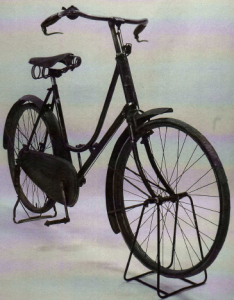
The Fuji company was founded in 1899 in Japan by Okazaki Kyūjirō. In 1900 it was established under the trade name Nichibei Shōkai (literally ‘Japanese-American Trading Company’). At first, it was importing and distributing US-products, but later it began bicycle production in Japan. During World War II the company name was changed to Dainippon Cycle, which after the war was changed back to Nichibei Fuji Cycle Company. By the late 1920s, they became Japan’s most popular bicycle. In the 1930s, the company established the first national stage race between Osaka and Tokyo and sponsored the winning team. Today, this race remains a premier race in Asia. The first Asian games were held in New Delhi in 1951. Shoichiro Sugihara, riding a Fuji, won the first race.
In the 1950s, Toshoku America acquired distribution rights to Fuji-made bicycles in the United States. There was an American division established as Toshoku America then under that, Fuji America was formed in 1971. Toshoku America sold private-label Fuji-made bicycles as house brands through U.S. retailers such as Sears & Roebuck and Montgomery Wards.
FIRST FUJI SHOP
The first person to setup an all Fuji shop was Ken Moriya. He negotiated with Fuji America to become an agent under the condition that the shop only sell Fuji’s. This Fuji center was opened in Rochelle Park, New Jersey.
During this period, Fuji became a partner with several contractors supplying parts for Japanese bicycles, including Sugino Cycle Industries and SunTour. Sales expanded into other Asian markets. At the 1964 Tokyo Olympics, Fuji’s chief engineer and designer, Dr Shoichiro Sugihara, designed the Japanese national team bicycles and was team coach. He repeated this role at the 1968 Olympics in Mexico and the 1972 Olympics in Munich, Germany.
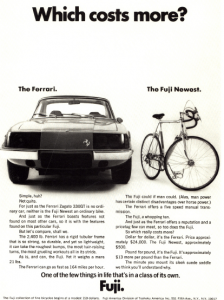 By 1971, Fuji America was established to distribute models across the United States. At this time Toshuku private label models were discontinued. Fuji’s entire line of bicycles were displayed at the 12th International Cycle Show in New York.
By 1971, Fuji America was established to distribute models across the United States. At this time Toshuku private label models were discontinued. Fuji’s entire line of bicycles were displayed at the 12th International Cycle Show in New York.
FUJI MAJOR PLAYER DURING THE CYCLING BOOM
Fuji played a part in the cycling boom of the 1970s. It introduced the first successful mass-production 12-speed bicycle in the mid-1970s, using a redesigned rear axle to minimize spoke dish to maintain wheel strength. In 1974, Richard Ballantine, author of Richard’s Bicycle Book, recommended Fuji road bicycles at or near the top of each of four price and quality categories, from basic (low-price) to professional (high-end).
TOURING BIKES AND TITANIUM
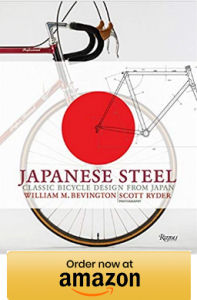
During the early 1980s, Fuji developed touring bicycles, and in 1986 was one of the first to manufacture frames of titanium. Fuji was not well situated to take advantage of the mountain bike boom of the 1980s. Consequently, the demand for mountain bikes caused a steep decline in touring and road bike sales. This allowed manufacturers such as Specialized, Giant, and Trek to make inroads into the brands share of U.S. bicycle sales. These brands were using frames produced at lower cost in Taiwan.
YEN TO DOLLAR AFFECTS FUJI SALES
With the continued rise of the yen, the company fell on hard times in the early 1990s. They were one of the last Japanese bike companies to shift production to Taiwan after the fall of the dollar. Consequently, their bicycles ended up costing more in the United States than most competing brands, causing a drop in sales. Additionally, the bicycles produced in Taiwan were not as well regarded by U.S. buyers as the Japanese-built bicycles.
FUJI TAKES ADVANTAGE OF NEW TECHNOLOGY
The company eventually designed new models, taking advantage of modern improvements in materials and construction techniques. However, this proved insufficient. Toshoku America filed for bankruptcy in 1997, and in 1998, Nichibei Fuji Cycle Company Ltd., Fuji America’s parent company, also declared bankruptcy.
BANKRUPTCY AND DISTRIBUTION
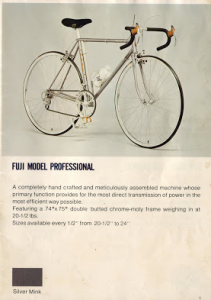 Following bankruptcy, bicycle distribution in the United States was taken over by Advanced Sports. Subsequently, in 1998, Jadeland Pacific, an investment group in Taiwan, acquired 100% of Advanced Sports, which had purchased the assets of Fuji America as well as the worldwide distribution rights to the Fuji bicycle brand.
Following bankruptcy, bicycle distribution in the United States was taken over by Advanced Sports. Subsequently, in 1998, Jadeland Pacific, an investment group in Taiwan, acquired 100% of Advanced Sports, which had purchased the assets of Fuji America as well as the worldwide distribution rights to the Fuji bicycle brand.
IDEA BIKE CORPORATION TAKES OVER
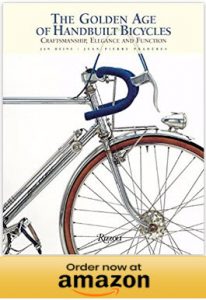
In 2004, Ideal Bike Corporation, Taiwan’s third-largest complete-bicycle maker, acquired 17% of Advanced Sports International Asia, which markets the Fuji brand of bicycles in Asia. Of course, Fuji bicycles are now built in Taichung, Taiwan, Dong Guan, Guangdong Province, China. However, they are also being manufactured in Kutno, Poland by Ideal Bike Corporation.
In the United States, the Fuji brand is owned and distributed by Advanced Sports International (ASI), a privately held corporation located in Philadelphia, Pennsylvania.
Unfortunately, in November 2018 ASE (the parent company of ASI and Performance Bicycle) declared bankruptcy, leaving the fate of US distribution of Fuji bicycles uncertain.
It was reported on January 17, 2019 that HEAD was buying the assets of ASE (the parent company of Fuji) out of bankruptcy.[5] As luck would have it, on January 22, 2019 it was reported that Head Sports backed out of the deal to buy ASE. On February 1, 2019 it was reported that the Tiger Group won the auction for ASE.
CLICK ON ITEM FOR MORE INFORMATION
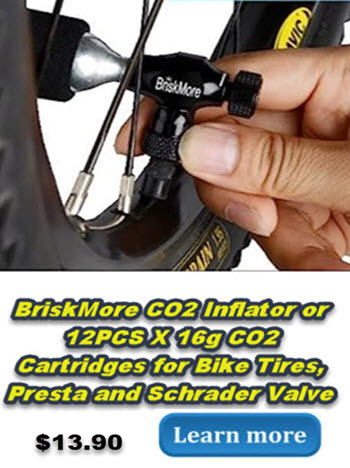 |
 |
 |
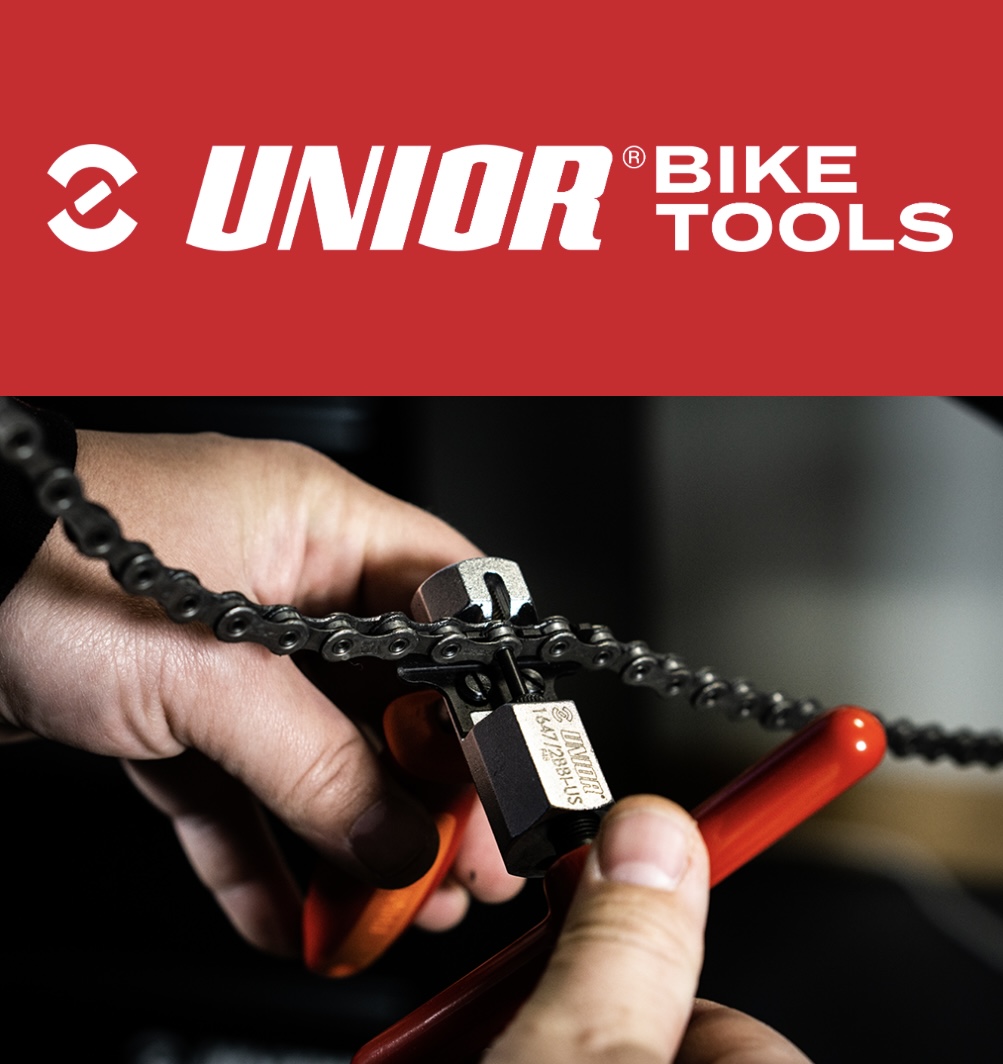 |
We link items through our Amazon Affiliate Links. What are Amazon affiliate links? It’s a way for you to help your favorite creators! It doesn’t cost you anything to use our links and we will get a small % of the sale. You can actually go to another item you were going to buy anyway and tell us thanks by using our link. It’s a win win! We give info and our time, you buy what you need. Thank you for your support.
